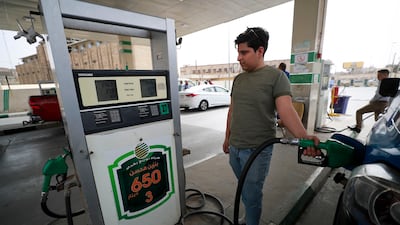The Iraqi government has announced plans to increase the cost of fuel by up to 30 per cent, with the higher prices to come into effect from the start of May.
At its weekly meeting, the cabinet decided to raise the price of premium petrol (95 octane) from 650 Iraqi dinars per litre ($0.50) to 850 Iraqi dinars ($0.65).
Super petrol (98 octane) will be increased from 1,000 Iraqi dinars to 1,250 Iraqi dinars. Regular petrol (low octane) will remain at 450 Iraqi dinars.
The decision has caused frustration among Iraqis feeling the effects of the country's fragile economy and rising costs of living.
"It's a new disaster," said Suleiman Hussein, a politics and economics researcher in Baghdad. "When you increase the petrol price, don't forget to raise the salaries of employees.
Social media influencer Mustafa Emad warned the decision would have a knock-on effect. "With increased petrol prices, the prices of everything – food, medicine and other things – will be increased as well, because it will affect transport," he said.
The government needs instead to focus on fighting against corruption and improving public services, he added. "I warn against staying silent about such decisions. They retaliate against the Iraqi citizens, burdening and shackling them," he said.
Iraqi Prime Minister Mohammed Shia Al Sudani, who has been in office since October 2022, has launched series of projects to rebuild infrastructure and attract foreign investors.
He also promised to fight against endemic corruption and to introduce reforms.
The government also plans to increase taxes and to introduce levies to new sectors, including ride-hailing companies and social media influencers, the general director of the General Commission of Taxes, Ali Waad Allawi, said in a statement this month.

Iraq, Opec’s second-biggest producer after Saudi Arabia, offers fuel subsidies that contribute to the budget deficit. The country’s debilitated refining sector has forced the government to import petroleum products to meet the local demand.
According to Global Petrol Prices, Iraq has been ranked 14 in the list of the world's cheapest petrol prices this month, while Iran has the cheapest price of $0.029 per litre.
In the past, the government has hiked prices to cut the government subsidy bill, freeing up investment for building more refineries, but each move to reduce fuel subsidies causes public backlash.
The government justified the latest decision as part of plans to encourage public transport to reduce traffic congestion and promote the use of gas as an alternative and cheaper fuel for vehicles.


